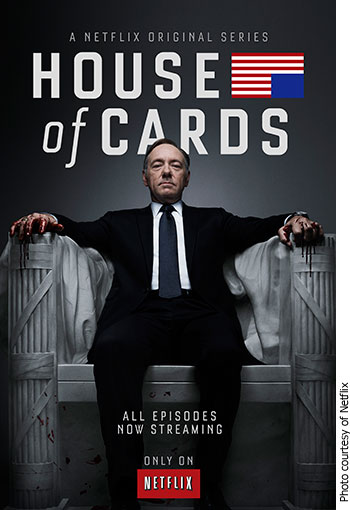Tags
Related Posts
Share This
Hollywood exodus? Why small screen is our new realm of storytelling
Does Hollywood production seem a bit vacant of late? Star Kevin Spacey and ace writer Aaron Sorkin are nowhere to be found. Steven Soderbergh’s director’s chair is empty. And where have these big talents gone?
Answer: They’ve crammed themselves into a TV set. From Spacey starring on House of Cards to Sorkin creating The Newsroom, big names in the film industry are making the move to TV. And many observers are calling TV the future vehicle for intelligent storytelling.

Never look back: Movie veteran Kevin Spacey now stars on Netflix’s original-TV hit series House of Cards.
In his 2013 speech to students at the University of Southern California, Steven Spielberg said that his 2012 Academy Award-winning film Lincoln almost never made it to the big screen, and was instead going to become a made-for-TV HBO movie. Film studios today seem increasingly wary of making dramas that won’t appeal to mass audiences. “In the industry’s current state, even proven talents are having difficulties getting their own movies into theatres,” said Spielberg. Jim Sheridan, a six-time Oscar nominated director, echoed Spielberg’s words in a press conference at last year’s Busan International Film Festival in Korea. “I think Hollywood is making movies for China and India and Brazil and Russia. So they don’t want dialogue movies. They don’t want dramas. They’ve migrated the drama to TV,” he said. With international box office sales on the rise, industry experts predict that China will overtake the U.S. in 2020 as the world’s biggest film market. If Hollywood is going to produce more movies that rely on special effects and are geared to the international market, how are filmmakers like Spielberg going to make dramatic films such as Lincoln?
Why story matters
“The writing for TV over the last five to seven years has gotten so much better,” says Frances Brennand Roper, who has worked with Caroline Sinclair Casting and is currently producing Escape of the Living Dead, a sequel to George Romero’s Night of the Living Dead. Rather than having an hour and a half in a movie theatre to tell a story, Roper says that writers are able to create much longer narratives in a TV season, which means more story and character development. “The content is the massive draw,” says Roper, commenting upon the film industry’s migration to TV.
‘The writing for TV over the last seven years has gotten so much better.’ — producer Frances Brennand Roper
The success of long-running TV shows like Game of Thrones has helped create a demand for quality TV series, which in turn has provided new opportunities for actors. “Eighty per cent of lead roles in TV are offered to big names,” says Roper. One example would be Steve Buscemi, who stars in HBO’s Boardwalk Empire. Roper says that while access to bigger roles is continually getting harder, there are opportunities for up-and-coming actors to get supporting roles, thanks to the proliferation of new TV shows.

Producer Frances Brennand Roper says the demand for quality TV series is providing new opportunities for talent from Hollywood.
Mandy Safavi, an Executive Producer behind last fall’s theatrical release of Ender’s Game, and President of Tall Girls Productions, is seeing more filmmakers wanting to work in TV because of its creative freedom. With its plethora of visual effects, films like Ender’s Game are fairly easy to market; however, Safavi says, “It’s harder to make films that are more character driven and dramatic. That style of filmmaking has now moved over to cable television.” Safavi’s work involves transitioning movie talent, such as writers who are open to it, into the TV business. Her company, Tall Girls Productions, focuses on bringing new female talent to both film and TV, in front of and behind the camera.
The business end of things
How is it that smaller cable TV companies are attracting talent over the much older and more experienced film studios? Says Roper, “Unfortunately, movie studios are run by businessmen and women who don’t know anything about making films. Of course they understand the business side and employ the directors and producers, but ultimately a lot of the decisions are made by the executives, and these people don’t know what the best thing is creatively.” According to Roper, studio executives generally look for formulas in scripts; for example, an action movie must have a certain number of shootouts in order for an executive to decide whether or not the film will make money. “If studios always did this, movies like Forrest Gump would never be made. Luckily, this isn’t always the case, as recent studio films like Prisoners and The Way Way Back were brilliant,” she says. In the case of a cable television channel such as HBO, there is less of an executive hierarchy to answer to. “It’s less of an intense business model in terms of red tape and bureaucracy,” says Roper. This is why smaller cable television companies are able to leave creative control in the hands of the artists. In fact, as Safavi says, “In television, the writer is the king, because the TV industry is a lot more collaborative. The writer, who is usually credited as the series’ creator, has a lot more say.”
‘In television, the writer is king, because TV is a lot more collaborative. The writer has a lot more say.’ — producer Mandy Safavi
Like HBO, the Internet streaming service Netflix makes creativity a major priority when it comes to original content. In his speech at the 2013 Edinburgh Television Festival, Kevin Spacey applauded Netflix for trusting the creators of House of Cards to produce the entire first season without having to shoot a pilot episode. Spacey explained that they wanted to create a sophisticated, multi-layered story that would take a long time to tell, something that would have been difficult if faced with the pressure of making a pilot. Television networks such as Fox and ABC, which are bigger than cable companies, have a bureaucratic system similar to movie studios. But unlike studios, networks have begun focusing to create edgier, dramatic shows in order to compete with the likes of cable. “TV networks have had to step their game up and produce better shows, because cable channels like HBO and Showtime have been crushing them,” says Roper. Matt Coatsworth, who worked as an assistant to an executive producer on Ender’s Game, admits that working with studios and TV networks can result in a loss of creative control, but says he understands the need for businessmen in the industry. “You need marketing teams to know what’s trending. You need people to sell the movie. Although having creative control is ideal, a filmmaker has to sometimes learn to adapt,” he says. Coatsworth has been trying to independently produce multiple television projects, including a children’s cartoon, but he’s met many challenges and has considered going to a television network to finance it, even though he will potentially lose some creative control. “When you hear ‘no’ from many different people, the other direction starts to look a lot better,” he says.
The game changer: technology
Technology also seems to be playing a significant role in the shift to TV. With easier accessibility to TV and movies provided by Internet companies such as Netflix, small screens are being favoured by millions of viewers. “Technology is changing how we view content,” says Coatsworth. “With fewer movies being made and the rise of the 13-hour TV season, the shift is already happening.”

Playing to convenience: Netflix allows you to keep up with your favourite show while on the go, with your smartphone or tablet.
Roper says that technology has given this generation “an insatiable appetite” for entertainment content. “People now ‘binge watch’ TV shows, so Netflix was smart to release the whole season of House of Cards all in one go,” she says. “I think a lot of other platforms will start to follow their lead. Hulu, Amazon and YouTube are already making their own content.” But what will the future hold for the big screen? Safavi says that there will be fewer people going to the cinema in the future. “Features will have to reinvent themselves now with the many different ways that people are viewing content. I think a lot of people will be less inclined to go to the movies and be happy to stay at home and watch something on HBO like Game of Thrones.” Safavi still enjoys feature films, but she says that it is a changing landscape and it will be interesting to see where it ends up. Some of these changes are already becoming evident with the emergence of the superticket at selected theatres: Moviegoers can purchase these higher priced tickets, which offer incentives such as advanced screenings and digital copies of the film. One recent example of a movie that implemented the superticket is Anchorman 2, starring Will Ferrell. Whether somebody goes to the cinema to catch the latest blockbuster, or prefers to stay home binge watching the latest season of The Walking Dead, the film and TV industries are clearly in for some changes. Whatever the direction the industry decides to take, Roper says, “The talent will follow wherever the great stories are.” Home-page photo courtesy of Netflix.





